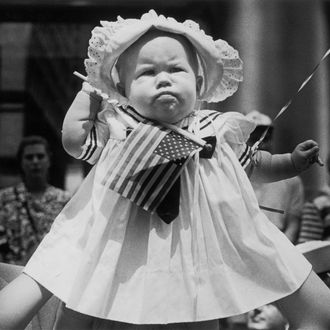
We Americans take pride in a lot of our things: our optimism, our work ethic, our endlessly innovative fast-food offerings, and, of course, our babies. A simple, slightly creepy Google image search reveals that the 50 states produce some top-notch infants, many of them wearing adorable outfits. What babies could possibly compete with our babies?
But a recent study in the European Journal of Developmental Psychology makes a startling claim: As the press release puts it, “Dutch babies laugh, smile and like to cuddle more than their American counterparts.”
The researchers assessed a bunch of Dutch and American infants at 6 and 12 months by giving their parents a survey called the Infant Behaviour Questionnaire-Revised, which, as the name suggests, gauges a given infant’s behavioral tendencies. The Dutch infants were, overall, more chilled out than their American counterparts. Some of the potential reasons for this are interesting, so it’s worth excerpting a bit of the press release here:
A cultural emphasis on cognitive stimulation may lead U.S. infants to be more active and aroused than their Dutch counterparts, the researchers suggest. American infants also demonstrated higher levels of fear, frustration, and sadness and lower levels of falling reactivity (infants’ ability to lower own distress/arousal).
“It was very interesting for me to go through the prep courses we offer for first-time moms in the United States,” Gartstein said. “The emphasis on cognitive stimulation–teaching moms how to use toys to interact with their baby, reading books aloud to infants, etc.–becomes really clear.”
In contrast, Dutch babies demonstrated greater expressions of happiness during routine activities and were easier to calm or soothe when upset. The researchers hypothesize the Dutch infants’ relatively calm demeanors were due in part to a more regulated sleep schedule and lower intensity activities.
“Two things that are very important to Dutch parents are reserving specific times for sleep and not over-stimulating their children,” Gartstein said. “For example, when the parents take the baby home from the hospital they often send out cards inviting friends to visit with the mom and baby at certain times so they won’t interrupt the baby’s sleep schedule. Also, I was struck by how little Dutch parents use toys when they play with their children, relative to U.S. parents.”
So sure, maybe those Dutch babies are a bit cuddlier. But that’s because they’re less stressed out than the hard-working American babies, who know that if they don’t hustle to get their cognitive development up to speed, they may get shut out of top-notch preschools. Who has time to cuddle? As an American baby, every moment you spend cuddling is a moment that baby across the street spends preparing for the ultra-competitive global workplace.
In other words, stop being so lazy, Dutch babies. USA! USA!




